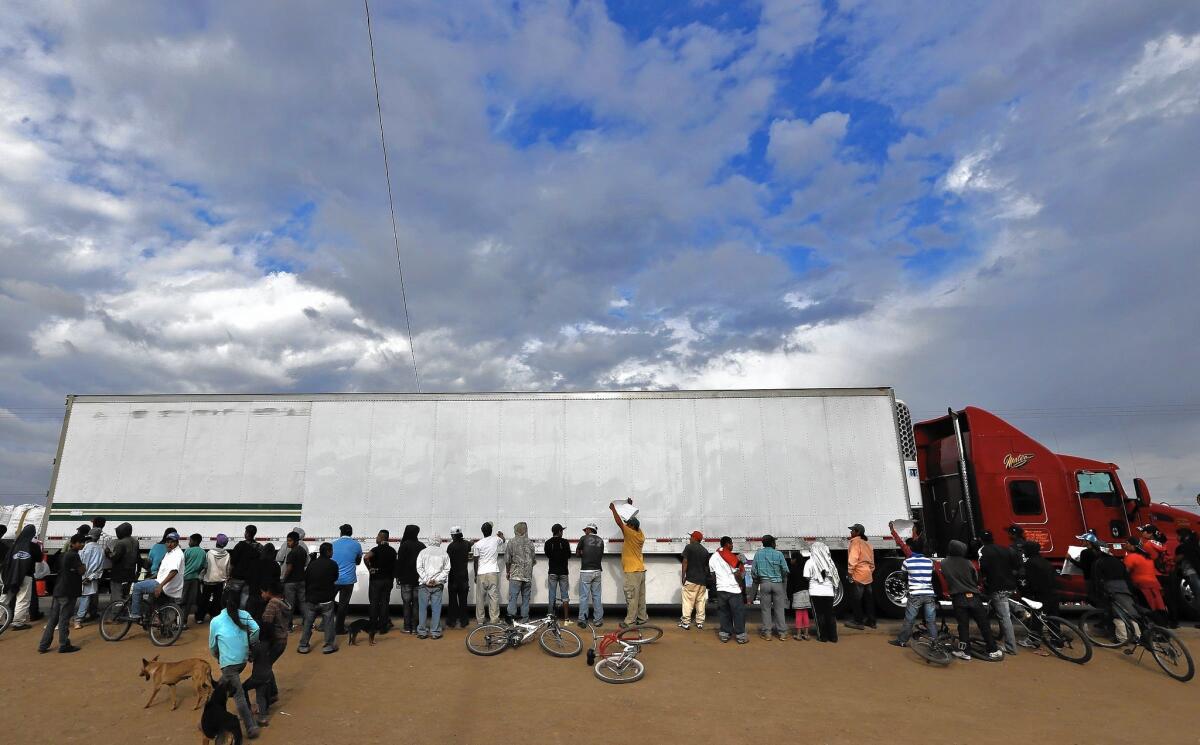Mexican farmworkers target Driscoll’s, a firm with labor-friendly image

- Share via
Driscoll’s, the world’s largest berry distributor, began importing produce from Baja California’s San Quintin Valley more than 20 years ago. In that time, the California-based company has cultivated an image of social responsibility in an industry better known for its faults.
The farm laborers who pick Driscoll’s berries earn some of the highest wages in the region and get social security benefits. There’s a lunchroom and a clinic staffed with nurses, and days begin with an exercise session.
But the labor movement that has emerged in the Mexican coastal region 200 miles south of San Diego is now targeting Driscoll’s, alleging that its carefully crafted image obscures a record of unfair labor practices.
Marchers have yelled insults at the polished trucks carrying Driscoll’s berries and blocked the company’s workers from getting into the fields. Police keep watch outside its giant shipping facility near San Quintin.
Last week 100 people protested in support of the Baja labor movement outside a Driscoll’s facility in Oxnard. Mexican news outlets have published stories about farmworker leaders threatening a consumer boycott of Driscoll’s products, which are available at Wal-Mart, Safeway, Kroger and many other U.S. retailers.
The animosity toward the California company and its main grower in San Quintin, BerryMex, comes as farmworker leaders struggle to keep pressure on the industry after last month’s rare strike by thousands of farmworkers. Most returned to the fields when negotiations fell apart nearly two weeks into the walkout.
Growers say laborers went back to work after accepting generous wage hikes. But leaders continue to press for better pay and conditions, saying laborers returned to the fields out of desperation.
Leaders are seeking wages of $13 per day and overtime pay and calling for growers to provide government-required benefits such as social security. They also want crew bosses to stop sexually harassing female pickers, one of several points on which they have reached agreement with growers.
There are dozens of exporters in the region whose products reach U.S. supermarkets. But Driscoll’s is the only one with a global brand, making the company both admired and vulnerable.
Driscoll’s executives say their company is being unfairly singled out.
“We’re not happy about the way we got drawn into it. We’ve been put out front, and that’s where everybody can put the pressure,” Soren Bjorn, executive vice president of the Driscoll’s of the Americas business unit, said in an interview. “The way Driscoll’s operates in San Quintin is how growers should operate.”
He said the company is at the forefront of improvements benefiting Mexican farmworkers and has been pushing the industry to follow suit.
The company, he said, has a leading role in the International Produce Alliance to Promote a Socially Responsible Industry. The coalition of produce industry groups was formed in February after The Times published “Product of Mexico,” a series of articles that documented labor abuses at Mexican export farms.
Labor leaders in San Quintin acknowledge that BerryMex treats its workers better than other growers in some ways. The company has agreed to larger wage hikes than other growers and provides social security benefits.
But they complain that the company shortchanges workers on some required benefits, imposes onerous work quotas and exaggerates its wage levels. Driscoll’s, in a statement last week, said BerryMex workers can earn $5 to $9 an hour.
That amount is inaccurate, farmworker leaders and several current and former BerryMex workers said. They say that under optimal conditions workers earn no more than $3 an hour, and that after peak harvest periods, pay drops to about half that amount.
One grower from the region, DeWayne Hafen, also questioned the BerryMex wage figures. Most pickers fill about 30 boxes a day during peak harvest periods, earning about $3.50 an hour, he said. The $9 figure, he said, isn’t possible.
“I don’t care how good you are, it ain’t happening,” Hafen said. “Maybe they’re paying that in the States, but not here in Mexico.”
BerryMex workers complained that they are pressured to work seven days a week during the harvest. If they take Sunday off, they are docked $13 to $20 and can’t return to work until the following Wednesday, they said.
Executives from Driscoll’s and BerryMex strongly denied the accusations. “The average earnings, as part of the increased wages, bonuses and benefits we’ve announced and implemented are entirely accurate,” Hector Lujan, BerryMex’s chief operating officer, said Friday.
BerryMex, he said, doesn’t force laborers to work seven days or dock worker pay. Executives said the company is back at full employment levels of about 3,000 workers. Strikers, using threats and intimidation tactics, had kept many workers from showing up in the early days of the strike, they said.
“Our workers have expressed their appreciation with the increased wages and this is backed up by the 100% attendance by our workforce since March 31,” Lujan said.
About one-quarter of the berries Driscoll’s gets from Baja come from growers other than BerryMex. Driscoll’s declined to provide the names of the other suppliers, which were described as small, locally owned farms.
Twitter: @ricardin24
More to Read
Sign up for Essential California
The most important California stories and recommendations in your inbox every morning.
You may occasionally receive promotional content from the Los Angeles Times.











